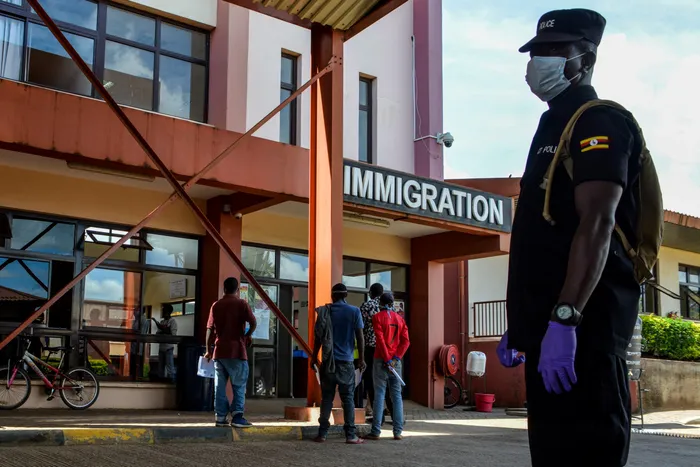
A Ugandan security officer stands guard as truck drivers go through the Uganda's immigration office in Malaba, a city bordering with Kenya, in Uganda, on April 29, 2020. All truck drivers ferrying goods crossing the border from Kenya must take a test for the COVID-19 by Ugandan health officials and wait 24 hours to get the result. After entering Uganda, the driver must stay inside the truck, only allowed to get off to unload at the destination.
Image: AFP
Uganda stands out for its progressive refugee policy, a cornerstone of its leadership in refugee affairs. This policy, which has been carefully crafted through legal and institutional frameworks championed by Kampala and endorsed by AU assemblies, grants refugees rights often denied elsewhere. These rights include freedom of movement, access to land for agriculture, and the right to work, education, and healthcare. As a result, Uganda hosts approximately 1.85 million refugees as of May 2025, the highest number in Africa.
Uganda's established credibility and extensive experience in managing forced displacement led to its selection as the host for the inaugural African Humanitarian Agency. This decision was made during the 45th AU Executive Council in July 2024, with Uganda securing 85.66% of the votes, demonstrating the AU's confidence in its leadership. The agency, scheduled to commence operations in the 2025/26 fiscal year, will be responsible for coordinating humanitarian response efforts across the continent. This initiative highlights Uganda's influential role in shaping the AU's migration governance framework.
Uganda has gone beyond merely hosting, actively shaping AU-wide policy by reframing migration as a developmental issue rather than a security threat. This pivotal definitional shift, championed by Uganda through the AU's Labour, Employment and Migration Division, was highlighted at a June 2024 AU event validating a three-year plan for the Global Compact for Migration, where stakeholders were reminded that "African Migration is a developmental issue not a security issue." This approach has significantly influenced AU discourse and directives, including the Migration Policy Framework for Africa (MPFA) and Agenda 2063, firmly rooting refugee and migrant frameworks in the contexts of shared economic growth, education, and public health.
Uganda's commitment extends beyond mere rhetoric, as evidenced by Kampala's proactive implementation of community-based solutions. The Regional Development and Protection Programme (RDPP) exemplifies this by linking support for settlements with local host communities in northern districts like Adjumani, Arua, Kiryandongo, and Yumbe. Through the rebuilding of schools, roads, and health facilities, Uganda fosters integration and minimises friction between hosts and refugees. This approach has become a template cited in AU policy discussions and replication models throughout East Africa.
Uganda demonstrated its leadership in migrant health by facilitating a continental convergence on a shared Migration and Health Strategy at the AU-IOM technical workshops in Kampala in December 2024. This initiative not only showcased Uganda's innovative national approaches but also its ability to convene multi-stakeholder processes. The Kampala dialogue, specifically, resulted in a roadmap to strengthen migrant health across origin, transit, and destination states, signifying a move away from previously fragmented policy responses.
Uganda offers inspiring examples of grassroots initiatives. The Bidi Bidi Performing Arts Centre, established in 2022 within Africa's largest refugee settlement, fosters healing and social cohesion through creative expression. This center empowers Congolese and South Sudanese youth to overcome trauma through performance, music, and entrepreneurship, cultivating resilience. Similarly, urban programs such as YARID in Kampala equip urban refugees with vocational training and technology, promoting self-reliance and societal contributions. These local successes are frequently highlighted in AU policy discussions as scalable models.
Uganda's leadership is currently facing significant challenges. The country is shouldering an immense burden due to diminishing international aid. In May 2025, the World Food Programme ceased providing food rations to nearly one million refugees, as only 46% of the 2024 Refugee Response Plan received funding. Despite these difficulties, Kampala has maintained its open-door policy and has intensified its appeals at AU summits, including Africa Day 2025, where officials reiterated the nation's dedication to refugee integration.
Uganda is actively involved in discussions with AU member states and international partners to share its approach. For example, it has engaged with the European Union via the AU-EU-UN tripartite task force, concentrating on lasting solutions, repatriation policies, and an examination of the root causes of forced migration. Despite some disagreements, such as the EU's exploration of "return hubs" similar to those discussed in Rwanda and Uganda, the Kampala model emphasises rights, integration, and collective responsibility.
Uganda is set to remain a key player in shaping continental policy in 2025. With the African Humanitarian Agency now active, Uganda will strengthen coordination and lead humanitarian diplomacy among AU member states. This includes implementing frameworks for internally displaced persons through the Kampala Convention and for migrant health via the MPFA and Global Compact. Uganda's achievements, from rural settlements to urban projects, demonstrate that inclusive, rights-based refugee policies are not just morally sound but also economically and socially beneficial.
Uganda actively shapes the African Union's narrative, demonstrating deliberate authorship rather than passive compliance. Kampala effectively integrates policy and practice by hosting institutional mandates, re-framing migration as a developmental force, and creating integration models that overcome resource scarcity. As AU members confront new displacement crises in regions like the Horn and the Sahel, Uganda's leadership serves as both a beacon and a blueprint. It underscores the critical importance of placing refugee and migration governance at the core of Africa's future, rather than at its margins.
Written By:
*Dr Iqbal Survé
Past chairman of the BRICS Business Council and co-chairman of the BRICS Media Forum and the BRNN
*Sesona Mdlokovana
Associate at BRICS+ Consulting Group
African Specialist
** MORE ARTICLES ON OUR WEBSITE https://bricscg.com/
** Follow @brics_daily on X/Twitter & @brics_daily on Instagram for daily BRICS+ updates
